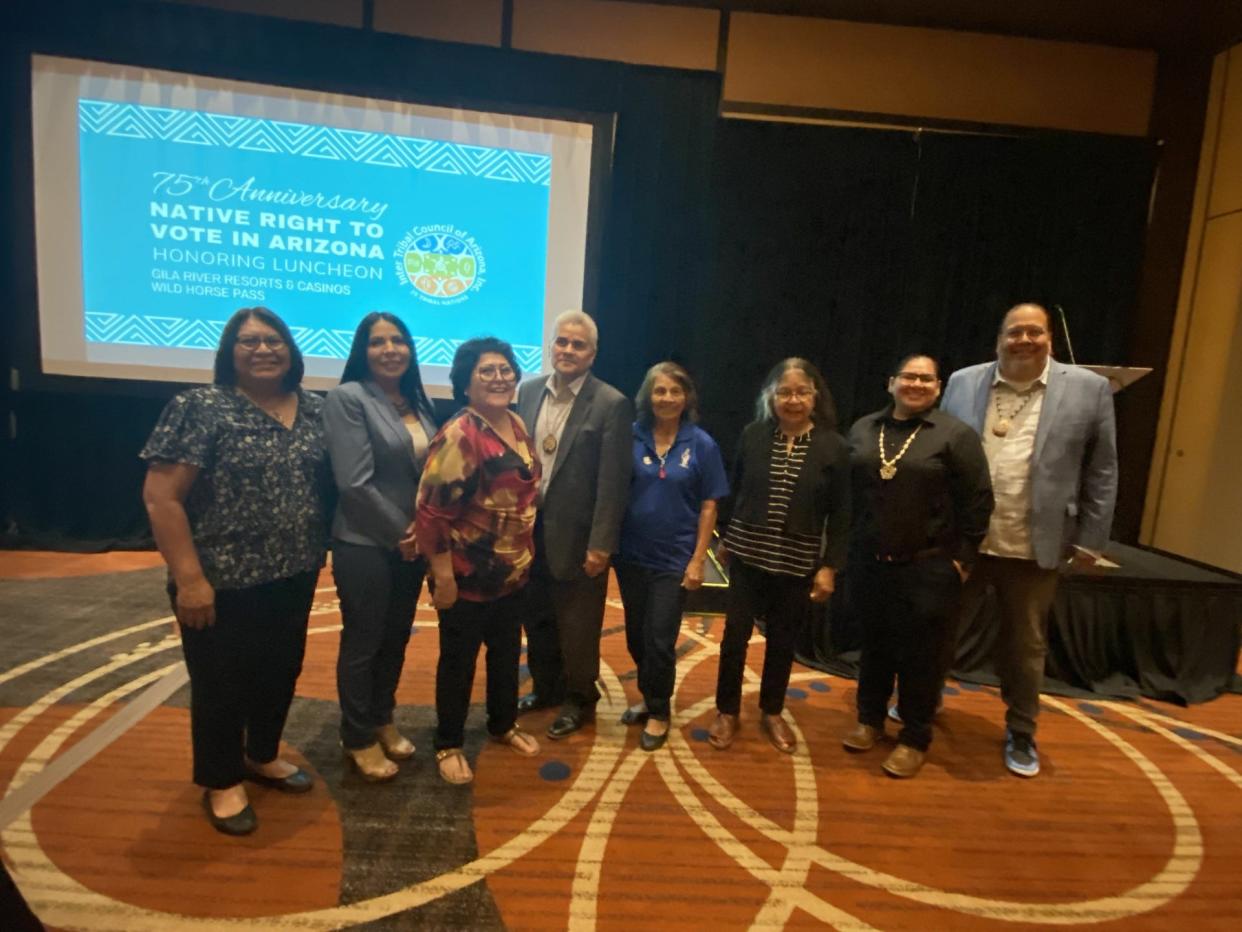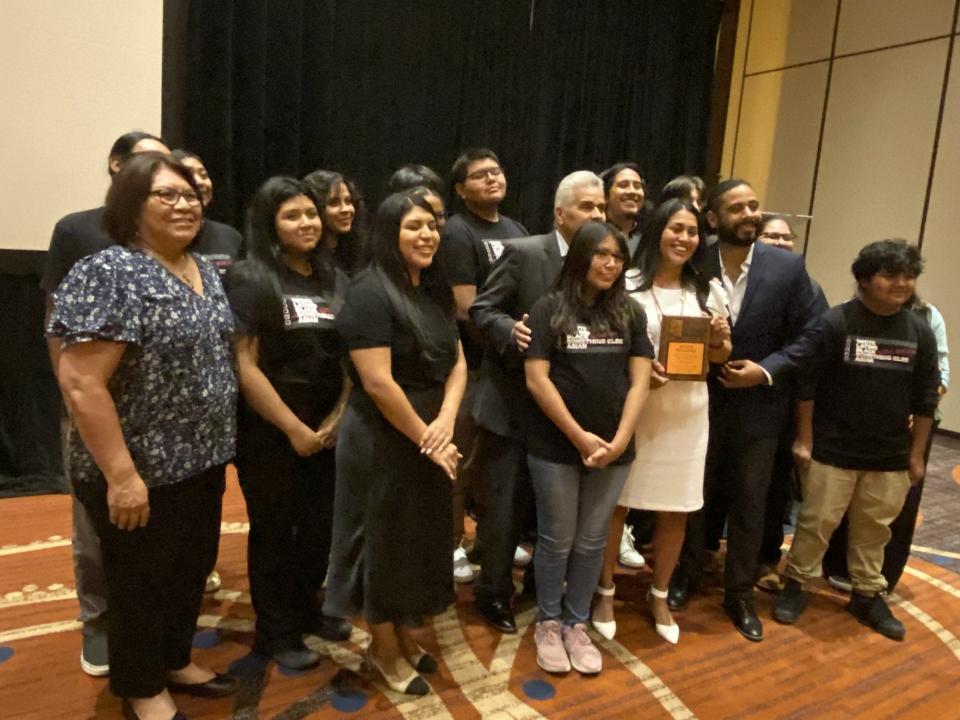Tribes mark 75 years of voting rights, but leaders say they remain vigilant

- Oops!Something went wrong.Please try again later.
GILA RIVER INDIAN COMMUNITY — Nearly 100 tribal leaders, voting rights activists and tribal members celebrated the 75th anniversary on Friday of the groundbreaking case that cleared the way for Native people to vote in state and local elections.
They also honored the first Arizona tribal members who attempted to secure the fundamental right in 1924, as well as contemporary voting advocates.
But 75 years after the groundbreaking affirmation of the rights of Indigenous people to cast ballots, tribes say they are still fighting attempts to suppress the Native vote.
The anniversary event, organized by the Inter Tribal Council of Arizona, featured speeches by Gila River Indian Community Gov. Stephen Roe Lewis and Fort McDowell Yavapai Nation President Bernadine Burnette. Arizona Gov. Katie Hobbs and Secretary of State Adrian Fontes sent video greetings.
"We stand on the shoulders of those who have gone before us," Lewis said.
He acknowledged a group of elders from his tribe who have long advocated for equal voting rights and human rights for Indigenous peoples. He also paid homage to the late longtime activist and ITCA staffer Alida Monteil and former Gila River Councilwoman Brenda Robertson, who recently died. Lewis also said that if tribal members had been able to vote when the tribe's water had been stolen in the late 19th century, history may have been different.
Burnette honored the Yavapais from her own tribe who won a pivotal battle in Native voting rights, Frank Harrison and Fort McDowell Chairman Harry Austin.
"I knew Frank Harrison personally," Burnette said. "Because of him and Mr. Austin, we could exercise our opinions. Voting impacts lives in many ways, she said, and she admonished the gathering to not be apathetic and think that their voice doesn't count.
Burnette said that what her fellow tribal members did was a "given, not a privilege or a right, but a given for American citizens in this country."
ITCA also showed a video detailing the history of the fight for Native voting rights in Arizona, featuring Harrison and the late Fort McDowell President Clinton Pattea.
Voting rights history: Native people won the right to vote in 1948, but the road to the ballot box is still bumpy
Why tribes in Arizona celebrate July 15, 1948
Four years after Native people were made U.S. citizens, two Gila River tribal members, Peter Porter and Rudolf Johnson, filed suit to affirm that they had the same right to vote in elections as other citizens. Their suit was denied on the basis that Native Americans were considered "wards" of the U.S., and thus were unable to register or vote.
Two Fort McDowell Yavapais saw a way around that. Frank Harrison was a decorated veteran of World War II and had previously advocated for tribal members to obtain good-paying construction jobs at Bartlett Dam. He returned home a war hero to Fort McDowell, about 30 miles northeast of Phoenix.
At that time, Yavapais and other Native people in Arizona had homes with no running water, electricity or floors. His parents as well as other Native elders, who were denied old age benefits, had to work hard just to eke out a living. Harrison determined that conditions would never change unless Indians could vote to change them.
He and a fellow Yavapai, tribal Chairman Harry Austin, met with civil rights attorneys Richard Harless, Lemuel Mathews and Ben Mathews to plan how to proceed. In 1947, Harrison and Austin walked into the Maricopa County Courthouse and attempted to register to vote. County Recorder Roger G. Laveen denied them, citing the state law.
The Yavapais left, and they and their attorneys immediately filed suit. After being turned down in Superior Court, they appealed to the Arizona Supreme Court, where they prevailed.
The state threw them a curveball, in the form of literacy and language tests that tribal members had to pass to be given a ballot. That and other barriers, including getting polling places in remote reservation communities, were overcome after 20 years of struggle and the Voting Rights Act, which placed Arizona on a list of states that were required to "pre-clear" any voting policies or laws through the U.S. Department of Justice.
Tribal voting advocates are still fighting. In 2022, ITCA signed onto a lawsuit that seeks to overturn two Arizona laws that instituted stringent requirements to prove residency, which many tribal members and rural residents can't meet, and that require registrars to purge voting records under circumstances the bills' opponents say would suppress tribal voting.
"We know it's no accident," Lewis said. "These laws targeted our tribal communities."

Angela Willeford of the Salt River Pima-Maricopa Indian Community, one of two community vote award winners, said the Native vote turned the tide in the 2022 election for Hobbs.
"The Native vote accounts for 4% of the total turnout," she said. "Hobbs won by a margin of 3%." She also called for more Native people to volunteer to work in elections since they understand that tribal IDs are valid and other issues that may occur when Indians go to polling places to cast their vote.
Robert Jackson of Gila River, the other award winner, was honored for his voter information forums, where he brought in elected officials and candidates to showcase their positions to tribal voters.
Lewis added, "We show up because we know that it matters who sits in those state offices, those federal offices, on our state and federal courts, and especially on the Supreme Court."
"It sure makes a difference for tribes in Arizona," Burnette said. "We laid the foundation; you're here to uphold this right and carry on."
Debra Krol reports on Indigenous communities at the confluence of climate, culture and commerce in Arizona and the Intermountain West. Reach Krol at debra.krol@azcentral.com. Follow her on Twitter at @debkrol.
Coverage of Indigenous issues at the intersection of climate, culture and commerce is supported by the Catena Foundation.
My articles are free to read, but your subscriptions support more such great reporting. Please consider subscribing today.
This article originally appeared on Arizona Republic: 75 years after tribes won the right to vote, they are still fighting

